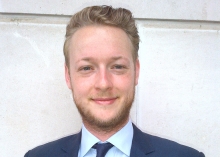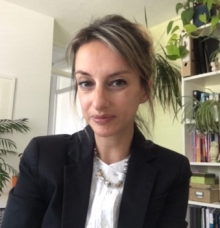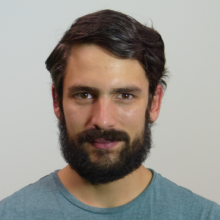
Showing content for section Overview
Overview
If you're passionate about studying global conflict and co-operation at postgraduate level, but you can't commit to attending university every week, this MA International Relations and Politics offers a convenient way to study a Master's.
Through intensive blocks of study, you'll graduate with the skills and knowledge for creative roles in security, development, social policy, governance, advocacy and communications, in local to global institutions.
The University of Portsmouth is ranked the number 1 modern university for research quality in Area Studies
Research Excellence Framework (REF) 2021
Course highlights:
- Fit each module into a week's intensive study, with a few weeks' rest between to focus on your life and career commitments
- Explore the contours of contemporary insecurity, examine the key drivers of political and public policy decision making across the globe, and apply key analytical concepts to local and international political developments
- Devise, research and deliver a major academic project
- Challenge conventional explanations and participate in key debates about international conflict, global politics and public policy.
- Develop advanced analytic skills, and how to communicate your analysis in engaging reports, policy briefs and essays.
- Study with internationally-recognised academics, including members of the Centre for European and International Studies Research (CEISR) and the Jean Monnet Centre of Excellence for the Study of a Transnational Europe
Contact information
Contact AdmissionsEntry requirements
MA International Relations and Politics Master's degree entry requirements
Qualifications or experience
- A minimum of a second-class honours degree in Politics, International Relations, Peace Studies, Sociology, History, or another relevant subject. Equivalent (directly relevant to course content and extensive) professional experience and/or qualifications will also be considered.
English language requirements
- English language proficiency at a minimum of IELTS band 6.5 with no component score below 6.0.
If you don't meet the English language requirements yet, you can achieve the level you need by successfully completing a pre-sessional English programme before you start your course.
Why study a Master's in International Relations?
Meet current students and lecturers from the MA International Relations courses at the University of Portsmouth.
Ed Stoddard: The International Relations course is focused on a number of the really big issues that affect us as societies. Whether that's equality, whether that's poverty or whether that's security issues like terrorism and political violence. You know, we're looking at a series of really important contemporary issues that we read about every day in the newspaper. The reasons that students would want to study these courses is the flexibility.
Amanda: The schedule that I was able to work around with the teaching classes and the lectures, I really was able to fit all of those things into my daily life. I have a lot of children and a busy schedule and going back to school almost 20 years later, I just needed a programme that really fit into my schedule.
Samia: I had a great experience doing this distance learning. The lectures were all very available, very responsive. They helped in all aspects of learning, not just their specific modules. So I had a great experience.
Max: I think Portsmouth is such a unique city. Being by the sea is lovely, but you've also got all of the amenities that you'd expect from a big city.
Ed Stoddard: The university is literally at the heart of the city. I think also the university has a really strong focus on student support and a really strong focus on teaching quality.
Amanda: I absolutely felt well supported, both by students and colleagues and by the professors.
Amy: I did feel really supported. There's always a chance to kind of talk to your lecturers outside of class about what you were struggling with, talk about what you might not understand. There's a real space for students helping students. We have forums, we share Ed Stoddard: The International Relations course is focussed on a number of the really big issues that affect us as societies. Whether that's equality, whether that's poverty or whether that's security issues like terrorism and political violence. You know, we're looking at a series of really important contemporary issues that we read about every day in the newspaper. The reasons that students would want to study these courses is the flexibility.
Amanda: The schedule that I was able to work around with the teaching classes and the lectures, I really was able to fit all of those things into my daily life. I have a lot of children and a busy schedule and going back to school almost 20 years later, I just needed a programme that really fit into my schedule.
Samia: I had a great experience doing this distance learning. The lectures were all very available, very responsive. They helped in all aspects of learning, not just their specific modules. So I had a great experience.
Max: I think Portsmouth is such a unique city. Being by the sea is lovely, but you've also got all of the amenities that you'd expect from a big city.
Ed Stoddard: The university is literally at the heart of the city. I think also the university has a really strong focus on student support and a really strong focus on teaching quality.
Amanda: I absolutely felt well supported, both by students and colleagues and by the professors.
Amy: I did feel really supported. There's always a chance to kind of talk to your lecturers outside of class about what you were struggling with, talk about what you might not understand. There's a real space for students helping students. We have forums, we share WhatsApp numbers, there's always space to kind of help each other and see different perspectives.
Samia: My favourite part of the course was the online seminars, which we did with fellow colleagues. We got together, heard from different people with different backgrounds. It was just very interesting and exciting.
Amanda: I ended up learning so much through writing my dissertation and it was a scary assignment in the beginning, but working with the professors and the supervisors for the dissertation just made it a wonderful experience.
Amy: I love how all the lecturers and all of the professors do their own research as well as teach, and that's what I really wanted to get involved in, and that's why I chose Portsmouth.
Ed Stoddard: There are a lot of different career opportunities, opportunities in international organisations, international businesses, the Foreign Office, the Foreign Service and there's also a lot of opportunities and things like research and risk analysis. A lot of trajectories that lead towards really exciting careers.
Amanda: The Master's of International Relations at Portsmouth definitely gave me what I needed for the next step in my career. Throughout the course, learning everything that I did and speaking with the professors, even the other students, it really did prepare me for what I wanted to do next.
Max: I felt this course is really good, especially where I'm looking to go to, which was teaching afterwards, and it was a really good way of developing the skillset to be able to really understand and to attack a topic. So I felt there was always a good opportunity to develop.
Samia: I feel very well equipped for the future right now because not only did I gain a lot of information and knowledge, but also I know how to go about getting information and knowledge. So I feel very prepared. I'm ready to go.
Careers and opportunities
You'll build your opportunities for promotion and career development with this degree, shaping yourself into an active and informed global citizen. You'll develop the skills and knowledge to help you progress in – or enter – a career that values your awareness of ethical and effective action on the world stage.
Previous graduates from our International Relations and Politics courses have gone on to work in parliaments, political parties, third sector and civil society organisations.
Work experience and career planning
If you're not already in employment, our Careers and Employability service can help you find relevant work experience during your course. We can help you identify placements, internships, voluntary roles and opportunities that will complement your studies.
We'll also be available to help, advise and support you for up to 5 years as you advance in your career.
Modules
Full-time
Core modules
You'll examine pressing issues facing policymakers today - from terrorism to state collapse.
Reflect on new debates in security studies, and explore security topics like the changing nature of war, regionalism, development, and more through the lens of West Africa.
You'll also develop your perspective by critically debating the shifting meanings of security and processes of securitisation, and assess the capabilities and credibility of security providers.
By evaluating key theoretical frameworks, you'll develop your own informed perspectives on issues defining global cooperation and conflict - ranging from human rights to climate change.
Through applying these lenses to analyse the role of state and non-state actors in world affairs, you'll grapple with the pressing questions confronting diplomats and policymakers daily.
You'll analyse the influences on decision-makers and the constraints they face, sharing policies from your own part of the world to enrich your understanding.
Develop critical thinking to question principles and practices, as well as the ability to explain policy outcomes.
By evaluating changing technology and methods of warfare, you'll engage critically with debates about the evolving nature of security threats.
Gaining creative, reflective knowledge, you'll analyse policy issues connected to deterring modern dangers from states and non-state actors.
Optional modules
With academic guidance, you'll choose your own literature or empirical topic within a field of study that fits the parameters of your intended Master’s exit award.
You'll bring together everything you’ve learned to design and evaluate ethical methodologies, conduct systematic research, and communicate your ideas professionally in your dissertation or report.
With academic guidance, you'll explore a unique topic within a field of your interests that fits the parameters of your intended Master's exit award.
You'll bring together everything you've learned to design exhaustive methodologies, conduct systematic research, and communicate your ideas professionally in your dissertation.
You’ll critically engage with different analytical and problem-solving methods to understand data, how it has been gathered by others and how to gather data yourself.
You’ll also learn to identify which methods of analysis have been used in existing research as well as how to employ particular methods of analysis yourself within your dissertation.
You'll critically engage with different analytical and problem-solving methods to understand data, how it has been gathered by others and how to gather data yourself.
You'll also learn to identify which methods of analysis have been used in existing research as well as how to employ particular methods of analysis yourself within your dissertation.
Part-time
Core modules
By evaluating key theoretical frameworks, you'll develop your own informed perspectives on issues defining global cooperation and conflict - ranging from human rights to climate change.
Through applying these lenses to analyse the role of state and non-state actors in world affairs, you'll grapple with the pressing questions confronting diplomats and policymakers daily.
You'll analyse the influences on decision-makers and the constraints they face, sharing policies from your own part of the world to enrich your understanding.
Develop critical thinking to question principles and practices, as well as the ability to explain policy outcomes.
By evaluating changing technology and methods of warfare, you'll engage critically with debates about the evolving nature of security threats.
Gaining creative, reflective knowledge, you'll analyse policy issues connected to deterring modern dangers from states and non-state actors.
Core modules
You'll examine pressing issues facing policymakers today - from terrorism to state collapse.
Reflect on new debates in security studies, and explore security topics like the changing nature of war, regionalism, development, and more through the lens of West Africa.
You'll also develop your perspective by critically debating the shifting meanings of security and processes of securitisation, and assess the capabilities and credibility of security providers.
Optional modules
With academic guidance, you'll choose your own literature or empirical topic within a field of study that fits the parameters of your intended Master’s exit award.
You'll bring together everything you’ve learned to design and evaluate ethical methodologies, conduct systematic research, and communicate your ideas professionally in your dissertation or report.
With academic guidance, you'll explore a unique topic within a field of your interests that fits the parameters of your intended Master's exit award.
You'll bring together everything you've learned to design exhaustive methodologies, conduct systematic research, and communicate your ideas professionally in your dissertation.
You’ll critically engage with different analytical and problem-solving methods to understand data, how it has been gathered by others and how to gather data yourself.
You’ll also learn to identify which methods of analysis have been used in existing research as well as how to employ particular methods of analysis yourself within your dissertation.
You'll critically engage with different analytical and problem-solving methods to understand data, how it has been gathered by others and how to gather data yourself.
You'll also learn to identify which methods of analysis have been used in existing research as well as how to employ particular methods of analysis yourself within your dissertation.
Changes to course content
We use the best and most current research and professional practice alongside feedback from our students to make sure course content is relevant to your future career or further studies.
Therefore, course content is revised and regularly reviewed. This may result in changes being made in order to reflect developments in research, learning from practice and changes in policy at both national and local levels.
International Relations and Politics research at the University of Portsmouth
Ed Stoddard, Reader in International Security, explains how cutting-edge research like his (into the changing character of warfare) informs our courses and talks about some of the career opportunities this course can lead to.
Ed Stoddard: So the research I do here at the University is focused on the changing character of warfare.
Over the last few years I've been particularly focusing on questions to do with terrorism and violent extremism in the West African region, especially around the Lake Chad area.
And we use that research and distribute it at conferences and events with policymakers, both here in the UK, but also in West Africa as well. Armed conflicts are so destructive and, you know, I think it's incumbent on us as researchers who work in this area to try and think of ways they can be avoided, of course, in the first instance.
But if, when those armed conflicts do happen, try and think of measures that we can put in place to reduce their impact.
So the research connects with students here in a number of different ways. It supports the work they do in terms of their dissertations, but also directly into the modules that they study.
You know, our research, once we've done it and we've written the papers and we've publish the outputs, that gets then translated into the lectures that we deliver. So they will be directly learning and benefiting from that research that we've done out in the field in their studies and contributing to their degree.
There's a really broad range of different career opportunities that are available to students. The Foreign Office, the Civil Service and more broadly, the Ministry of Defence.
But also we have students who go to international organisations, NGOs, charities that work internationally in conflict zones, and we also have quite a lot of students who go into various research roles and risk analysis roles.
Portsmouth is a really exciting and vibrant city and the university is literally at the heart of the city. I think also the university has a really strong focus on student support and a really strong focus on teaching quality.
And I know that my colleagues spend very considerable amount of that time working to make sure that the experience for Portsmouth students is a really brilliant one. And I think those are some of the key reasons why students who are here really enjoy their degrees.
Teaching
The Block Taught MA International Relations and Politics is taught differently from our standard campus based courses.
Rather than staying in Portsmouth and studying several modules simultaneously for months, you'll travel to the University for a single week to study a single module, and hand in your coursework after the end of your module.
You'll then rest for a few weeks, before you return for the next one-week module. This intensive form of study can often be easier to fit around your work and other life commitments.
You'll be studying in a teaching environment in each module week, and take four taught modules over the year (or two each year for two years, if you're studying part time).
Teaching expertise
Our teaching staff are internationally recognised and actively researching in the areas they teach.
They're members of international professional associations for Politics and International Relations, such as the Political Studies Association, British International Studies Association, International Studies Association, European Consortium for Political Research and European Union Studies Association.
Teaching staff
These are some of the expert staff who'll teach you on this course:
How you're assessed
You’ll be able to test your skills and knowledge through informal assessments, seminars and peer review sessions before you do assessments that count towards your final mark.
You can get feedback on all practice and formal assessments so you can improve in the future.
You'll be assessed through:
- academic essays
- briefing papers and reports
- group presentations
- dissertation
Supporting you
As well as support by faculty teaching staff and your personal tutor, you can use the University’s Academic Skills Unit (ASK).
ASK provides one-to-one support in areas such as:
- academic writing
- note taking
- time management
- critical thinking
- presentation skills
- referencing
- working in groups
- revision, memory and exam techniques
In addition to support from the Academic Skills Unit (ASK), you'll have access to the following learning support:
- Moodle, a distance learning hub and interactive forum for tutors and students
- participation in Academic Enrichment Programme (AEP) activities to develop skills and knowledge beyond the assessed curriculum
- access to the Faculty Research Skills Hub to develop research skills
- access to the School Student Representatives Hub, to promote participation in the Quality Assurance processes
- support by the Faculty Librarian for accessing learning materials
- a personal tutor, personal tutorial meetings and dissertation supervision
Course costs and funding
Tuition fees
UK/Channel Islands and Isle of Man students
- Full-time: £10,400
- Part-time: £5,200 per year
EU (including Transition Scholarship)
- Full-time: £10,400
- Part-time: £5,200 per year
International students
- Full-time: £17,900
- Part-time: £8,950 per year
Fees subject to annual increase.
Additional costs
Our accommodation section show your accommodation options and highlight how much it costs to live in Portsmouth.
You’ll study up to 6 modules a year. You may have to read several recommended books or textbooks for each module.
You can borrow most of these from the Library. If you buy these, they may cost up to £60 each.
We recommend that you budget £75 a year for photocopying, memory sticks, DVDs and CDs, printing charges, binding and specialist printing.
If your final year includes a major project, there could be cost for transport or accommodation related to your research activities. The amount will depend on the project you choose.
Tuition fees terms and conditions
Funding your studies
Find out more how to fund your studies, including the scholarships and bursaries you could get. You can also find more about tuition fees and living costs, including what your tuition fees cover.
If you're a UK student, you may be eligible for a Government postgraduate loan, which you can use to help with course fees and living costs.
Applying from outside the UK? Find out about funding options for international students and our international student scholarships.
Apply
Unlike undergraduate applications, which go through UCAS, applications for this Master's course are made directly to us.
There's no deadline for applications to this course. We accept applications right up until the start dates in September and January, as long as there are places available. If you wait until your start month to apply, you may find that the course is full.
If you're applying as an international student, remember that you'll need to leave plenty of time to get your visa organised.
You can find more advice about applying in our Master's application checklist. International students and current students and recent graduates of the University of Portsmouth also have some different application options, which are detailed below.
Extra information for international students
If you're an international student, you can apply directly to us using the same application form as UK students.
You could also get an agent to help with your application. Check your country page for details of agents in your region. To find out what to include in your application, head to the how to apply page of our international students section.
If you don’t meet the English language requirements for this course yet, you can achieve the level you need by successfully completing a pre-sessional English programme before you start your course.
Ready to apply?
September 2024 start
- Full-time study (1 year)
- Part-time study (2 years)
January 2025 start
- Full-time study (1 year)
- Part-time study (2 years)
I'm a current Portsmouth student, or a recent Portsmouth graduate
If you're currently in your final year of study at Portsmouth, or you graduated since July 2023, you're eligible to make a fast track application. You'll have:
- a shorter application form to complete
- access to the 20% Alumni fee discount
- a guaranteed conditional offer, for most Master's courses
After you apply
Once we receive your application, we may ask you for further information. We will then either make you an offer or suggest alternatives if your application is unsuccessful.
You'll usually get a decision within 10 working days, so you shouldn't have to wait too long. Some courses have an interview stage – we'll let you know if you need to prepare for one.
Learn more about how we assess your application.
Admissions terms and conditions
When you accept an offer to study at the University of Portsmouth, you also agree to abide by our Student Contract (which includes the University's relevant policies, rules and regulations). You should read and consider these before you apply.




